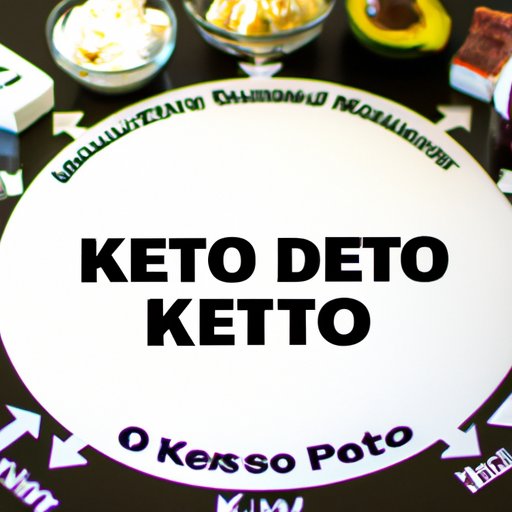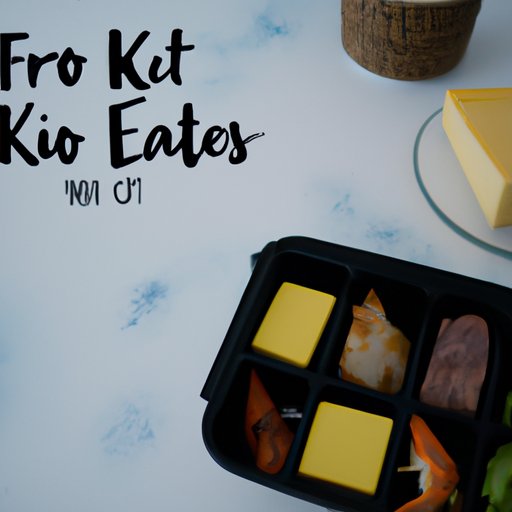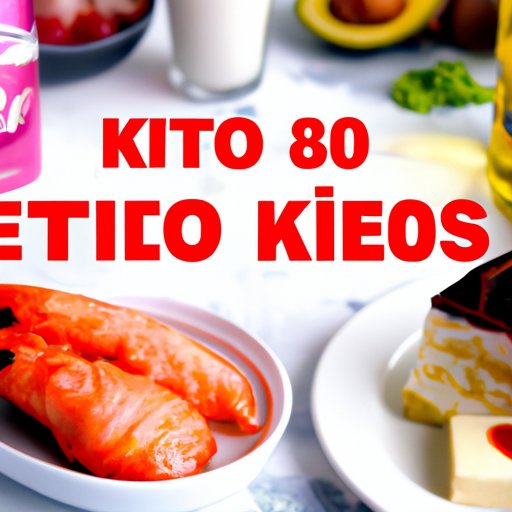Introduction
The keto diet has become increasingly popular in recent years as a way to lose weight and improve overall health. The diet is based on a low-carb, high-fat approach that restricts carbohydrates and encourages the body to enter a state of ketosis. In this metabolic state, the body burns fat for energy instead of glucose from carbohydrates. But understanding what you can and can’t eat on the keto diet is essential for success.
This article will provide an overview of what you can’t eat on the keto diet and why it’s important to pay attention to what you eat. We’ll also explore the foods to avoid when eating out and provide a beginner’s guide to avoiding unhealthy foods on the keto diet.

Overview of the Keto Diet
The keto diet was developed in the 1920s as a way to treat epilepsy in children. Since then, it has been used to treat other medical conditions such as diabetes and obesity. The diet is based on the idea of reducing carbohydrate intake and replacing those calories with fat. This forces your body into a state of ketosis, where it begins to burn fat for energy instead of glucose from carbohydrates.
To achieve ketosis, most people need to keep their total daily carb intake to under 50 grams. To do this, it’s important to understand what you can and can’t eat on the keto diet. This includes avoiding certain foods that are high in carbohydrates or contain added sugars.
Why You Should Pay Attention to What You Can’t Eat on the Keto Diet
When it comes to following the keto diet, paying attention to what you can’t eat is just as important as knowing what you can eat. Eating the wrong foods can throw off your body’s ability to enter ketosis, resulting in weight gain and other problems. That’s why it’s important to pay attention to the foods you should avoid on the keto diet.
The Essential Guide to What You Can’t Eat on the Keto Diet
Here’s a look at the foods you should avoid on the keto diet. Keep in mind that some of these foods may be allowed in small amounts, but they should be eaten sparingly. It’s also important to note that everyone’s needs are different, so you may need to adjust your diet accordingly.
Common Foods to Avoid on the Keto Diet
The following foods should be avoided on the keto diet:
- Sugary foods such as candy, cookies, cakes, and pastries
- White bread, pasta, and rice
- Fruits and juices
- Most dairy products, including milk and yogurt
- Beans and legumes
- Starchy vegetables such as potatoes, corn, and peas
- Certain nuts and seeds
- Processed foods and condiments
- Alcoholic beverages
Sugars and Starches to Avoid
One of the most important things to remember when following the keto diet is to avoid simple carbohydrates, such as sugar and starches. These foods are broken down quickly by the body and can cause blood sugar spikes. This can lead to cravings and make it difficult to stay in ketosis.
It’s important to avoid added sugars, such as those found in candy, cookies, cakes, and pastries. You should also avoid white bread, pasta, and rice, as these are high in simple carbohydrates. Instead, opt for complex carbohydrates such as whole grains and legumes.
Fruits and Vegetables to Avoid
Fruits and vegetables are an important part of any healthy diet, but some of them should be avoided on the keto diet. Fruits can be high in natural sugars, so it’s best to limit your intake to small amounts of berries. Starchy vegetables, such as potatoes, corn, and peas, should also be avoided, as they can cause blood sugar spikes.
Dairy Products to Avoid
Dairy products, such as milk and yogurt, should be avoided on the keto diet. Dairy products can be high in carbohydrates and can also contain added sugars. If you do decide to include dairy in your diet, opt for full-fat varieties, such as heavy cream, cheese, and sour cream.
Grains and Legumes to Avoid
Grains and legumes, such as beans and lentils, should also be avoided on the keto diet. These foods are high in carbohydrates and can cause blood sugar spikes. However, some grains, such as quinoa, are allowed in moderation.

Exploring the Foods to Avoid on the Keto Diet
In addition to the foods listed above, there are several other foods that should be avoided on the keto diet. Here’s a look at some of the most common ones.
Processed Foods to Avoid
Processed foods are typically high in carbohydrates and unhealthy fats, making them a no-no on the keto diet. Examples of processed foods to avoid include chips, crackers, and frozen meals. It’s best to opt for whole, unprocessed foods whenever possible.
Sweeteners to Avoid
Artificial sweeteners, such as aspartame and sucralose, should be avoided on the keto diet. These sweeteners can cause blood sugar spikes and can also interfere with ketosis. Instead, opt for natural sweeteners, such as stevia or monk fruit extract.
Alcoholic Beverages to Avoid
Alcoholic beverages should be avoided on the keto diet, as they are high in carbohydrates. Beer and wine are particularly bad, as they are often made from grains, which can cause blood sugar spikes. Hard liquor is allowed in moderation, but it’s best to avoid it altogether.
Eating Out on the Keto Diet: What You Should Not Eat
Eating out can be tricky on the keto diet, as many restaurants serve dishes that are high in carbohydrates. Here’s a look at some of the restaurants and types of food to avoid on the keto diet.
Fast Food Restaurants to Avoid
Fast food restaurants should be avoided on the keto diet, as they typically serve dishes that are high in carbohydrates. Examples of fast food restaurants to avoid include McDonald’s, Burger King, and Taco Bell. Instead, opt for healthier options, such as salads or grilled chicken.
Other Restaurants to Avoid
Other restaurants, such as Italian and Chinese, should also be avoided on the keto diet. These restaurants often serve dishes that are high in carbohydrates, such as pasta, rice, and noodles. It’s best to opt for dishes that are higher in protein and healthy fats, such as fish, steak, and eggs.

10 Foods You Should Never Eat on the Keto Diet
The following 10 foods should never be eaten on the keto diet:
- Ice Cream
- Candy
- White Bread
- French Fries
- Soda
- Cake
- Fruit Juice
- Regular Pasta
- Baked Goods
- Beer
Carbs to Avoid on the Keto Diet
Carbohydrates should be limited on the keto diet, as they can cause blood sugar spikes. The following foods are high in carbohydrates and should be avoided:
- Starchy vegetables, such as potatoes, corn, and peas
- Beans and legumes, such as black beans and chickpeas
- Whole grains, such as oats, wheat, and barley
- Sweets, such as candy, cookies, and cake
A Beginner’s Guide to Avoiding Unhealthy Foods on the Keto Diet
Following the keto diet doesn’t have to be complicated. Here are a few tips to help you avoid unhealthy foods on the keto diet:
Read Labels Carefully
Reading labels carefully is one of the best ways to avoid unhealthy foods on the keto diet. Look for foods that are low in carbohydrates and free of added sugars. Also, be sure to check the serving size, as some foods can be surprisingly high in carbohydrates.
Avoid Processed Foods
Processed foods are typically high in carbohydrates and unhealthy fats, which means they should be avoided on the keto diet. Instead, opt for whole, unprocessed foods, such as meats, fish, eggs, nuts, and vegetables.
Choose Healthy Alternatives
When it comes to following the keto diet, it’s important to choose healthy alternatives. For example, instead of white bread, opt for whole grain bread. Instead of regular pasta, try zucchini noodles. And instead of soda, opt for sparkling water.
Conclusion
Understanding what you can’t eat on the keto diet is essential for success. This article has provided an overview of the foods to avoid on the keto diet, as well as tips for avoiding unhealthy foods. By avoiding the foods listed above and sticking to a low-carb, high-fat diet, you can achieve your weight loss goals and improve your overall health.
(Note: Is this article not meeting your expectations? Do you have knowledge or insights to share? Unlock new opportunities and expand your reach by joining our authors team. Click Registration to join us and share your expertise with our readers.)
